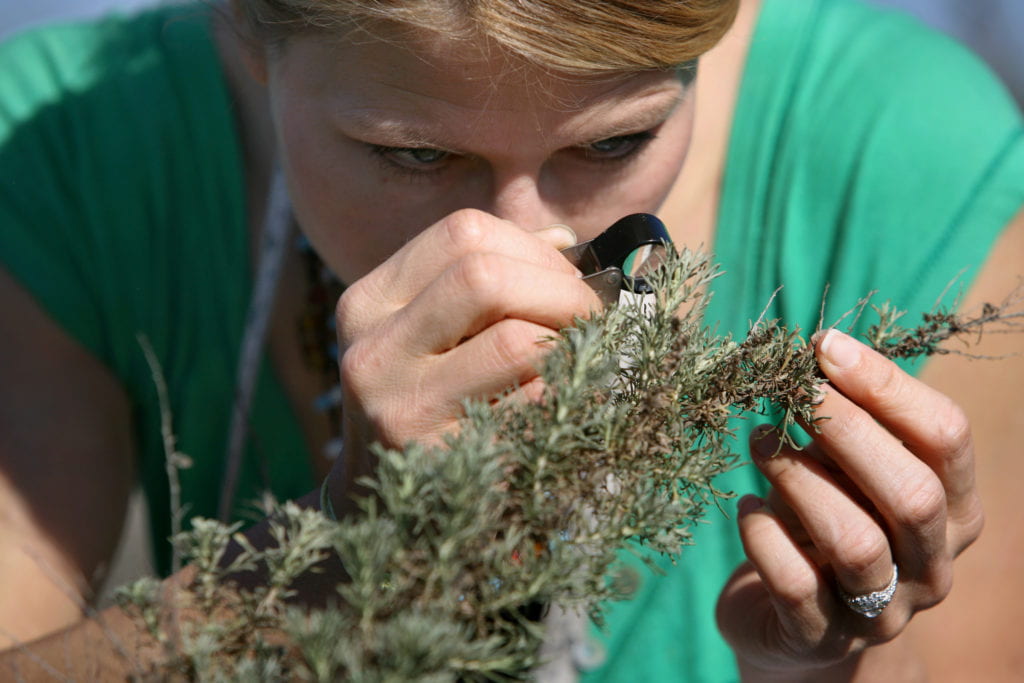The sweet smell of success
Jessica Pratt is looking for the most cost-effective way to save unique and precious California habitat.
When Jessica Pratt arrived in Southern California in 2005, her boyfriend drove side streets to their new home, fearing a freeway trip would make her flee back East.
Thanks to love and a bit of country perfume, Pratt – now a UC Irvine doctoral candidate in ecology & evolutionary biology – has made peace with the cars and concrete in Orange County.
She is studying the effects of pollution, declining rainfall and other environmental changes on coastal sage scrub – a plant community unique to California – and the animals that live in it. One of the most specialized habitats on Earth is also the most endangered landscape in the U.S. because of development and fragmentation. A welter of local, state and federal agencies is trying to figure out how to best manage and restore the pieces that are left.
“Predicting plant and insect community responses to environmental change is critical to the success of habitat restoration efforts, particularly in Southern California, with its multiple stressors,” says Pratt, 31, a native of rural Michigan.
Her main focus is Artemisia californica – also known as “cowboy cologne” – the fragrant grey-green sagebrush that once filled area ranch land.
She’s so devoted to her work that she has literally vacuumed sagebrush on the hillsides of Newport Beach’s Back Bay, picking up more than 280 insect species. Many are believed to be critical to the diets of rare songbirds, lizards and other fauna, yet they have not been studied extensively.
Pratt’s research and dedication have earned her a 2011-12 Public Impact Fellowship. Instituted by Graduate Division Dean Frances Leslie, the $10,000 awards support UCI students whose work has the potential to significantly benefit society.
Taxpayers and private donors currently spend millions trying to properly manage the remnants of coastal sage scrub and other diverse habitats that remain on public and private land. Pratt hopes to determine which strategies are most effective for the least cost. In addition to scouring local slopes, she tends patches of sagebrush from Northern California to the Mexican border.
She has begun transplanting artemisia from those areas to hillsides near UCI to see which shrubs may have adapted to best withstand particular environmental challenges. Sagebrush from more arid San Diego stretches, for instance, seems better able to cope with less precipitation. It might be better to plant sagebrush from there on Orange County hillsides, to prepare for predicted persistent drought caused by global warming.
“This work addresses basic issues in community ecology in an applied framework that will be immediately useful in informing land management and policy decisions for coastal sage scrub restoration,” Pratt wrote in her fellowship application. “Understanding the response of dominant species to environmental change and how those responses scale up to affect other [species] will help us predict and mitigate the impacts.”
Colleagues agree and say her talents are well suited to the task.
“Jessica’s dissertation epitomizes the value of conducting top-notch science in the pursuit of addressing pressing environmental concerns,” says her doctoral adviser, assistant professor of ecology & evolutionary biology Kailen Mooney. “In addition to doing great research, Jessica is one of the most diligent, articulate and clear-thinking students with whom I’ve worked.”
Like the hardy sage she studies, Pratt has adapted to her environment. She married Riley Pratt, the fellow UCI biologist who picked her up at the airport seven years ago, and they’re expecting their first child this August. Pratt hopes nonprofits or government agencies can use her talents once she completes her doctorate, and she already actively volunteers in local conservation societies.
“The first several years we were here, I couldn’t wait to leave. But it’s worked out really well. You can actually have a bigger impact in places like Orange
County and other urban areas that really need help,” she says. “We’re planning to stay.”


